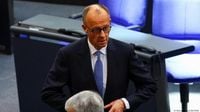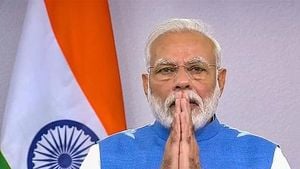Friedrich Merz, the leader of the Christian Democratic Union (CDU), faced a historic setback on May 6, 2025, as he failed to secure the necessary votes to become Chancellor of Germany. In a surprising turn of events, Merz received only 310 votes from the 630 members of the Bundestag, falling short of the 316 votes required for election. This outcome marks the first time in post-war German history that a candidate has not been elected Chancellor following a parliamentary election and coalition negotiations.
Merz's failure is significant, given that his coalition, which includes the Christian Social Union (CSU) and the Social Democratic Party (SPD), holds a total of 328 seats in the Bundestag. The implications of this vote are profound, as it suggests a lack of unity within the coalition. At least 18 members from the CDU/CSU and SPD coalition did not support Merz's candidacy, raising questions about the stability of the newly formed government.
As the political landscape shifts, the Bundestag now has 14 days to conduct a series of new votes to elect a Chancellor, either Merz or another candidate, by an absolute majority. If no candidate achieves this within the stipulated time, the threshold for election will be lowered to a simple majority in subsequent rounds. This means that the candidate who receives more votes in favor than against can be elected, a scenario that could further complicate the political situation.
The dynamics of the coalition are further complicated by the rise of the far-right Alternative for Germany (AfD), which recently gained traction in the parliamentary elections. Following Merz's defeat, AfD leader Alice Weidel declared that the vote revealed the fragile foundation of the coalition, calling for new elections and suggesting that Merz should resign. Weidel remarked, "This is a good day for Germany," reflecting the party's enthusiasm over the political turmoil.
In the lead-up to this election, the CDU/CSU and SPD coalition had been formed after the collapse of the previous government, which consisted of the SPD, Free Democratic Party (FDP), and the Greens. The early elections held in February 2025 saw the conservative bloc win 28.5% of the vote, while the AfD secured 20.8%, marking its best performance to date. Despite this success, the CDU/CSU's victory was not decisive enough to ensure a smooth transition to a new government.
Merz's political career has been marked by a series of comebacks and challenges. After initially stepping back from politics during Angela Merkel's chancellorship, he returned to lead the CDU in late 2022, positioning himself as a candidate for Chancellor in the recent elections. His platform included proposals for tax cuts and a reformed social security system, but his inability to unite his coalition raises doubts about his leadership and the feasibility of his policies.
As the Bundestag prepares for potential further voting rounds, the uncertainty surrounding Merz's candidacy and the coalition's stability looms large. The next vote is expected to be scheduled shortly, with discussions ongoing about whether it will take place on May 7 or May 9.
In summary, Friedrich Merz's failure to secure the chancellorship not only represents a personal setback but also highlights significant fractures within the coalition government. Political analysts are closely watching how this situation unfolds, as the implications could resonate throughout Germany's political landscape for years to come.





